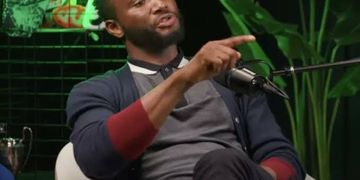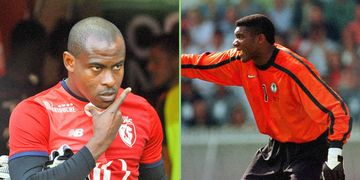At the end of yet another ten years of total football on the international scene, it’s time to take a pause and look at how our darling Super Eagles have fared over this period.
And having looked at the ten greatest matches played, the top ten goals scored by the Super Eagles, and Nigeria's top ten players in the period under review, Soccernet.ng embarks on another journey with the destination: the Super Eagles Best Starting XI of the last ten years.
GK: Vincent Enyeama
The former Lille shotstopper made his competitive debut for the Super Eagles at the 2002 FIFA World Cup and was influential for Nigeria’s senior national team for nearly a decade and a half afterwards, amassing over a century of international caps.
Success at club level in Nigeria and Israel were equally matched by his performances at the 2010 and 2014 World Cup – especially his duels against arguably the greatest footballer planet earth has ever seen, Lionel Messi.
Despite helping the Super Eagles to third-place finishes at the 2004, 2006, and 2010 Africa Cup of Nations tournaments, the finest highlight of his international career remains, captaining the team to victory in the 2013 edition of the tournament.
With all due respect to Peter Rufai and all the greats before him, Enyeama – Nigeria’s joint most capped player of all time – judging by his exploits this past decade, can now be regarded as the greatest goalkeeper in Nigeria's history.
RB: Kenneth Omeruo
After graduating from the Nigerian Under-20 team that reached the quarter-finals of the 2011 FIFA U-20 World Cup in Colombia where he shone like a million sparkling stones, Omeruo made his Super Eagles debut in 2013 and went on to play in all of Nigeria's matches at the 2013 Africa Cup of Nations as Nigeria went on to win the competition for the third time.
The young man has not relented since, having been part of the Super Eagles squad to the 2013 FIFA Confederations Cup, the 2014 FIFA World Cup, and the 2018 FIFA World Cup in Russia.
The 26-year-old was also at his dependable best last summer as Nigeria finished in third place at the 2019 AFCON tournament hosted by Egypt.
It is expected that the Leganes of Spain centre-half will add to his 51 caps in the next decade.
CB: William Troost-Ekong
At centre back is the towering figure of Udinese star Troost-Ekong who, despite representing the Netherlands at under-19 and under-20 youth levels, snubbed the Oranje's advances to play for his dearly beloved fatherland.
And though, huge were the boots previously worn by the likes of Uche Okechukwu, Taribo West and Joseph Yobo, Ekong has stepped into them brilliantly since making his international debut for Nigeria on 13 June 2015.
At just 26 years old and already with 41 caps of the national team, Ekong, one of Nigeria's finest in the last few years, can rise to be one of the greatest in the years to come.
CB: Joseph Yobo
Yobo retired in 2014 playing for only the first half of the decade but he had done enough during that period – winning 35 of his 101 caps – to guarantee his place on this list and many to come.
Having earned an incredible century of caps – more than any other before or after him – Yobo is a legend of the game, not just in Nigeria but all over the black continent.
A veteran of a World Youth Championship, three FIFA World Cups and six Africa Cup of Nations tournaments, the former Everton defender bowed out in 2014 after playing three of Nigeria’s four matches at the FIFA World Cup, a year after leading the Super Eagles to their third continental trophy in South Africa.
LB: Elderson Echiejile
A former youth international, the left-back made his senior debut on the eve of the decade and was picked for the following year's FIFA World Cup in South Africa, appearing in two group stage matches in an eventual group stage exit.
The former Monaco star was a regular feature at left-back for Nigeria since and was present in all the competitions the country took part in except the 2014 World Cup where an injury kept him out.
DM: Ogenyi Onazi
In front of the four-man defence is hard-tackling, tireless workhorse called Ogenyi Onazi.
Before there was midfield enforcer Wilfred Ndidi, Onazi was the one-man army marshalling the midfield and foiling the attacks of the enemy.
And he would always be remembered for his contributions in keeping Didier Drogba, Yaya Toure and co quiet as the Super Eagles romped to the African title six years ago.
The Trabzonspor midfielder, who missed the 2019 AFCON due to injury, has garnered 52 appearances for Nigeria’s senior team and should be back soon to compete with that Leicester City star for the defensive midfield role.
CM: John Mikel Obi
This past decade has simply been the John Mikel Obi show and it is only fitting that he bowed out from the international scene as the captain of the squad fourteen years after making his senior team debut.
The Silver Ball winner for the second-best player at the 2005 World Youth Championships in Holland (behind Lionel Messi), Mikel was always destined for greatness.
And greatness he has attained despite not winning the Best Africa Player award even once.
Mikel Obi has been the Austin Okocha of the last ten years for the Super Eagles, maybe not in terms of pure dribbling and creative talent, but certainly in terms of leadership qualities and enduring legacy.
Having enjoyed tremendous club success with Chelsea, the highlight of the midfielder’s national team career arrived in 2013 when he was one of the influential players as Nigeria went on to win their third continental title.
RW: Ahmed Musa
On the right-wing is Ahmed Musa who made his debut – at the age of 17 – for the Nigeria senior team in a qualification match for the 2012 Africa Cup of Nations against Madagascar, where he came on as a substitute for John Obi Mikel in a 2–0 win.
Since then, it is rare to see a Super Eagles team sheet without Musa in it with the former Leicester City forward now promoted to team captain following the retirement of John Mikel Obi.
The then teenager made his international breakthrough when his goals powered Nigeria to glory in the 2010 WAFU Nations Cup where he scored a goal against Benin.
Musa once nominated as one of the four players for Confederation of African Football Most Promising Talent Award, was a member of the squad that became African champions at the 2013 Africa Cup of Nations, where he scored in a 4–1 semifinal defeat of Mali and appeared as a substitute against Burkina Faso in the final, as the Super Eagles won their third continental title.
Musa, who currently plays for Al Nassr in the Saudi Premier League, is Nigeria's greatest goalscorer in World Cup history, grabbing a brace in a 4-2 loss to Argentina at the 2014 World Cup – first Super Eagles player to net a brace at the Mundial – and then smashing home another double in a 2-0 win over Iceland at the 2018 FIFA World Cup.
LW: Victor Moses
On the opposite flank is the talismanic wing wizard, Victor Moses who sadly called it a day with the national team last year. 13 goals in 38 appearances is a record many strikers would be proud of but Moses, from out wide, got them all without a hint of pride on his shoulders.
Since getting cleared in 2011 by FIFA to play for Nigeria, the former England youth international has been ever-present in most of Nigeria’s finest moment of the decade, from claiming the 2013 AFCON tournament to helping Nigeria make it to the second round of the 2018 FIFA World Cup.
CF: Emmanuel Emenike
The first of the two forward players on this list is Emmanuel Emenike. A burly, power-playing striker, Emenike was in action all through – bar the final where an injury kept him out – as Nigeria won the 2013 AFCON tournament in South Africa.
Emenike's four goals at that Championship were crucial in seeing off favourites such as Cote D'Ivoire with the striker picking up the Pepsi Tournament Top Scorer award for his efforts.
Emmanuel Emenike managed 9 goals in all in 37 games before calling time on his international career in June.
CF: Odion Ighalo
Partnering Emenike upfront is Shanghai Shenhua target man Odion Ighalo. Ironically, the exit of Emenike from the national team paved the way for Ighalo to pick up the Number 9 jersey after then Super Eagles coach Daniel Amokachi handed the Watford striker his first senior call-up.
With Nigeria absent at the 2015 and 2017 AFCON tournaments, Ighalo had to wait till the qualification campaign for the 2019 tourney before he truly came into his real element for coach Gernot Rohr's side, scoring seven times – the most of any player – to help Nigeria qualify for the finals in Egypt.
If Ighalo was prolific during the qualifying series, he took it a notch higher during the tournament proper, banging in five goals to emerge the top goalscorer in Egypt as the Super Eagles finished in third place.
He, however, announced his retirement at the end of the competition but not before sealing his spot on the best Super Eagles XI of the last decade.
Soccernet.ng's Super Eagles greatest XI of the decade
The Full List
Gk: Vincent Enyeama
RB: Kenneth Omeruo
CB: William Troost-Ekong
CB: Joseph Yobo
LB: Elderson Echiejile
DM: Ogenyi Onazi
CM: Mikel Obi
RW: Ahmed Musa
LW: Victor Moses
CF: Emmanuel Emenike
CF: Odion Ighalo



